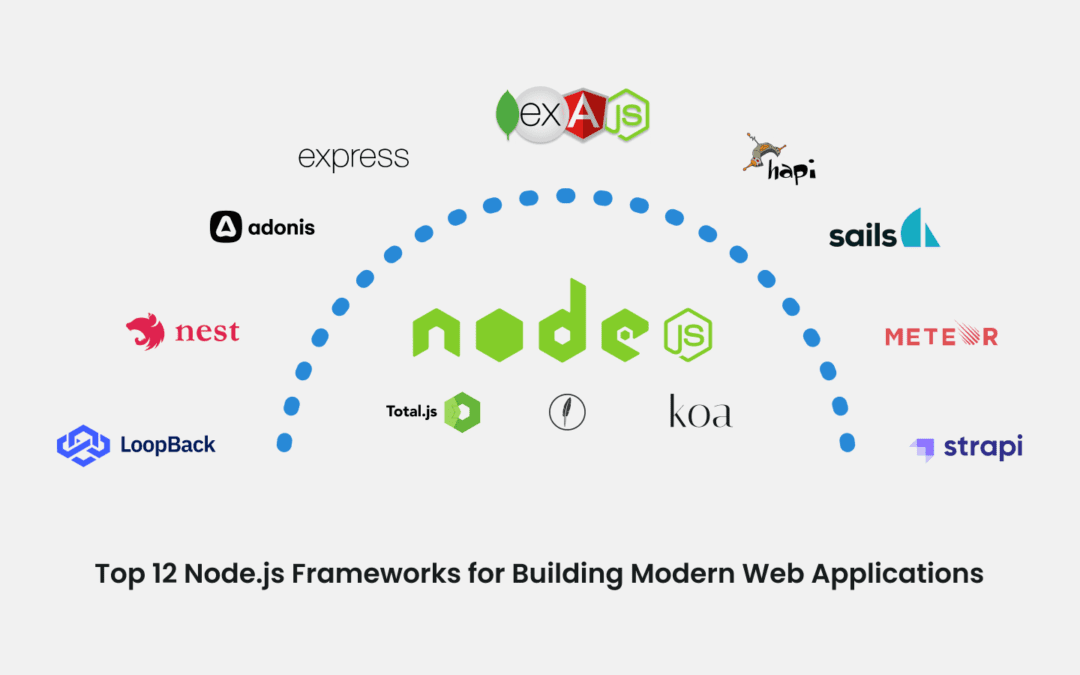Node.js Frameworks has emerged as a favored option among product owners for building server-side apps and APIs in digital product engineering. Its speed, scalability, and versatility make it a compelling choice. As JavaScript technology continues to evolve, Node.js only grows in popularity. By 2023, developers will have an array of robust frameworks tailored to their specific requirements.
The top 12 Node.js frameworks you should consider
In this blog post, we will explore the top 12 Node.js frameworks that you should consider when developing a new product or transitioning from a legacy stack to a more modern and reliable one.
Express.js
Express.js stands out as the most popular Node.js framework. It offers essential features for web application development while allowing developers the freedom to integrate additional components, if needed. This minimalistic framework is particularly suitable for creating RESTful APIs and web applications.
Nest.js
Nest.js provides a comprehensive and extensible framework for building scalable and manageable server-side applications. Based on the MVC approach and written in TypeScript, Nest.js is an excellent choice for enterprise-level applications.
Koa.js
Koa.js is a lightweight and modular framework created by the developers of Express.js. By focusing on middleware composition, Koa.js becomes a powerful tool for building high-performance APIs and web applications.
Hapi.js
Hapi.js is a versatile framework that emphasizes configuration-driven development. It excels in creating APIs and real-time applications, offering a range of powerful plugins for enhanced functionality.
Meteor.js
Meteor.js simplifies web application development by providing a full-stack platform. Out of the box, it offers real-time updates, making it perfect for real-time collaborative applications.
Sails.js
Designed for custom enterprise-level Node.js applications, Sails.js adheres to the MVC pattern and supports data-driven APIs and real-time features.
Adonis.js
Adonis.js is a full-stack framework that streamlines API development. Equipped with an ORM, web sockets, and essential features, it excels in building real-time, data-driven applications.
LoopBack
LoopBack is a robust framework that enables effortless API development. With extensive support for data sources and connectors, it becomes an ideal choice for crafting data-driven applications.
Feathers.js
Feathers.js is a lightweight and flexible framework for creating real-time apps and APIs. It boasts a robust service model and seamlessly integrates with various databases.
Total.js
Total.js is a progressive Node.js framework suitable for building web, REST, and real-time apps. It prioritizes reusability and maintenance, making it a perfect fit for long-lasting projects.
Strapi
Built on top of the Koa.js framework, Strapi is a headless open-source CMS that offers a robust content management system for applications. It provides customizable APIs for delivering content.
Mean.js
Mean.js is an all-in-one JavaScript framework that combines MongoDB, Express.js, Angular, and Node. It empowers the creation of dynamic one-page applications.
Conclusion
The Node.js landscape thrives in 2023 with a multitude of frameworks catering to diverse application requirements. Your framework choice should align with your project’s specific needs, whether it be real-time capabilities, scalability, or ease-of-use. Whether you are developing an API, a web application, or a real-time service, one of the following top Node.js frameworks will undoubtedly meet your development requirements.
